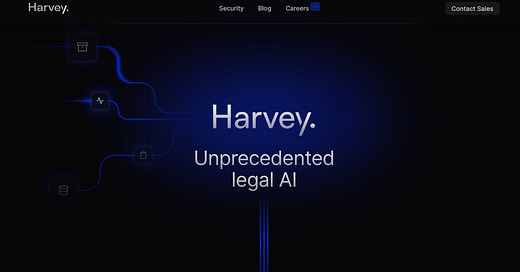Legal AI startup Harvey.ai just raised $80M in investment at a $715M valuation
Here's why I think that's a bad idea.
Harvey.ai offers law firms and Fortune 500 legal departments legal AI models (built on top of OpenAI).
According to this article they’re currently doing roughly $10M in revenue. It that’s true, their latest round was based on a 71x revenue multiple.
That is very high. For context, the average valuation for legal tech SaaS is currently 7.5x annual revenue.
I think this will make things hard for Harvey over the next few years:
Most startups run out of cash every 2 years and need to raise again.
For their next round their valuation will need to be roughly 2-3x higher to keep everyone happy, so it would need to jump to roughly $2.1 billion.
If Series C investors expect a more traditional multiple of 7.5x revenue (they may or may not!), that means worst case their revenue will need to jump from $10M today, to $280M in two years in order to fulfil their VCs expectations.
I don’t think that’s possible, especially given how much of their work is going to be custom implementation for each law firm which is harder to scale than a pure tech solution
It will especially hard in this case given the early stage of the business (and the generative AI market at large). It’s likely they still need to figure out what the product exactly is - they haven’t had time yet to find true product market fit. Yet they also need to scale very aggressively at the same time.
But the more customers you onboard and the larger your team is, the harder it is to make big product shifts. Having a huge customer base and a huge team is a bit like pouring cement over the ‘current way of doing things’. That’s all good when you have reached the ‘iterative’ stage of business, but it’ll kill you if you are still figuring things out.
The real issue is that their VCs will push them really hard to ‘grow into’ the valuation and then exceed it. This usually means pulling the only lever they have, which is to spend the money rapidly to hire more, market more etc.
Cash burn goes up, which means they’re even less profitable and will definitely need that next investment round in 2 years.
But if their revenue hasn’t shown that huge jump by then, they won’t be able to raise that round. That’s often referred to as the ‘valuation trap’.
There are unfortunately a lot of examples of startups that solve real problems with a decent solution, but ultimately can’t survive due to this valuation trap. They simply can’t raise again due to their high historic valuation and high cash burn. See a list here.
Falling into this trap is fair enough for some of those examples, they were ‘solutions looking for a problem’, and should perhaps not have existed to begin with.
I find it sadder though for companies that did get a lot of things right. They found a big problem to solve and made progress solving it, but ultimately had too many losses and with too high of a historic valuation to keep the company going.
Whereas if they had raised more normal sized rounds for their revenue level at a more normal valuation (with less financial waste), they would have been able to continue.
In short, excess cash combined with revenues that need to catch-up can be a burden. It creates perverse incentives to do things that don’t make sense.
It’s a bit like selling a $1 for $0.90 - your growth curve looks amazing, but it’s not sustainable! All in a desperate attempt to find such high growth rates that the market might simply not be able to provide for this kind of solution.
I sincerely hope I’m wrong on this and that Harvey will prosper. Aside from the fact I don’t wish it on any founder, there’s also the angle that big legal tech failures hurt the entire industry because they erode trust in a big way.
Thanks for being here,
Daniel




